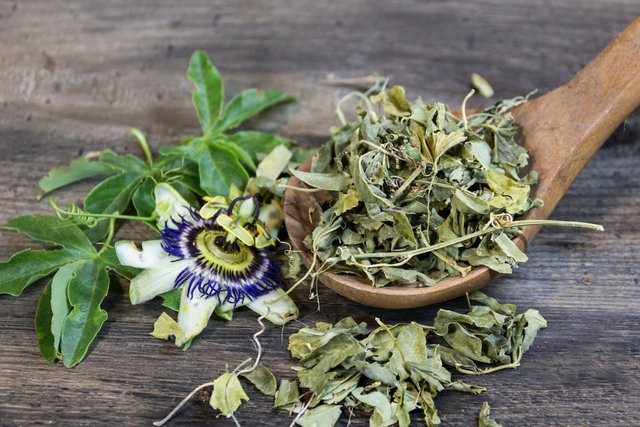Passionflower is the passion fruit flower, a plant with medicinal properties, which is widely used to relieve stress, combat anxiety and treat insomnia, due to its calming properties, which act on the central nervous system.
Furthermore, due to the presence of flavonoids, anthocyanins, alkaloids and amino acids, passionflower can also be used to treat menopause, high blood pressure and attention deficit, and should be consumed according to medical advice.
The scientific name of passionflower is Passiflora incarnata L. and can be purchased in health food stores, online stores and in some pharmacies.

What is passionflower used for?
Passionflower is used for:
1. Combat anxiety and stress
Passionflower contains flavonoids, such as chrysin, which interferes with the functioning of gamma-aminobutyric acid, GABA, which is a neurotransmitter that inhibits the central nervous system and helps regulate the sleep cycle, improve mood, and reduce anxiety and stress.
2. Regulate heart rate and blood pressure
Some studies indicate that passionflower helps reduce blood pressure values and heart rate due to its hypotensive, muscle-relaxing, vasodilating and cardiotonic properties. Therefore, passionflower can be indicated to complement the treatment indicated by the doctor for high blood pressure and cardiac changes.
3. Decrease menopause symptoms
Passionflower can help alleviate symptoms associated with menopause, such as heart palpitations, insomnia, hot flashes, headache and irritability, due to its composition.
4. Help in the treatment of attention deficit and hyperactivity
A study carried out with children with attention deficit hyperactivity disorder evaluated the effect of treatment with passionflower tablets, with improvement in symptoms and few side effects observed, when compared to medications normally indicated for the treatment of these situations.
However, although passionflower has shown good results in the treatment of attention deficit hyperactivity disorder, more studies are still needed to prove its effect.
5. Act as an anticonvulsant
Some flavonoids present in passionflower have an effect on the central nervous system, exerting anticonvulsant activity, in order to prevent and reduce the frequency of convulsive episodes and their duration, being useful in the treatment of absence seizures and epilepsy.
6. Prevent cancer
Passionflower contains chrysin, a flavonoid component with antioxidant and anti-inflammatory properties, exerting a protective effect against different types of cancer, such as breast, oropharyngeal, lung, colon, prostate and leukemia, for example. However, more studies are needed to confirm this effect of passionflower.
7. Relieve digestive problems
Passionflower is traditionally used to treat gastrointestinal diseases due to its anti-inflammatory and antispasmodic properties, helping to improve bowel function and alleviate digestive spasms associated with gastritis and colitis.
Furthermore, this plant has antibacterial activity and can act against bacteria Helicobacter pyloriwhich is associated with the formation of a stomach ulcer.
8. Treat inflammatory diseases
Passionflower has anti-inflammatory properties that promote the inhibition of some cytokines, enzymes and histamines that cause inflammation in the body in different situations, such as rheumatoid arthritis and psoriasis, for example. Therefore, this plant can be indicated as a complement to the treatment of these diseases.
How to use passionflower
To take advantage of some health problems and enjoy its benefits, passionflower can be consumed in different ways, such as:
1. Tea
Passionflower tea can be prepared by placing about 2 tablespoons in a cup of boiling water and leaving for about 10 minutes. Then strain and drink. In cases of insomnia, you should take 1 cup before bed or drink it about 3 times a day to reduce stress and anxiety.
2. Dyeing
Passionflower tincture can be found in pharmacies or health food stores and can be used in a concentration of 1:10 and the recommended dose is 40 drops diluted in 1 glass of water, 1 to 3 times a day, according to the advice of a doctor or herbalist.
3. Pills
Passionflower tablets can be made with other medicinal plants, such as valerian, and can be found in health food stores, with the recommended dose being 200 to 500 mg, 2 to 3 times a day, according to medical advice or advice. herbalist.
Possible side effects
The main side effect of passionflower is excessive drowsiness and therefore it is recommended not to operate machines or drive vehicles as reflexes may be reduced. Furthermore, it can also decrease blood pressure and reflexes.
In very rare cases, symptoms such as nausea, vomiting, headache and tachycardia may appear.
When it is not indicated
Passionflower is contraindicated for people allergic to the components of the formula and should not be consumed with alcoholic beverages, nor with other calming medications, with sedative or antihistamine effects. Furthermore, it should also not be taken simultaneously with aspirin, warfarin or heparin, antiplatelet drugs and non-steroidal anti-inflammatory drugs, as this can lead to bleeding.
This herbal medicine should also not be consumed during pregnancy, during breastfeeding, or by children under 12 years of age.

Sign up for our newsletter and stay up to date with exclusive news
that can transform your routine!
Warning: Undefined array key "title" in /home/storelat/public_html/wp-content/plugins/link-whisper-premium/templates/frontend/related-posts.php on line 12
Warning: Undefined array key "title_tag" in /home/storelat/public_html/wp-content/plugins/link-whisper-premium/templates/frontend/related-posts.php on line 13



